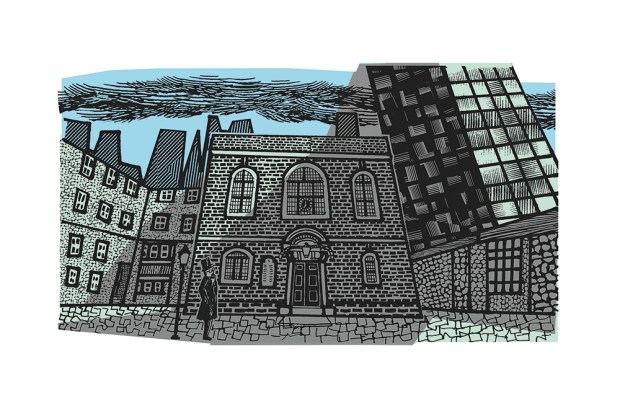I originally thought of calling this piece: ‘Kindness is the New Rock ’n’ Roll’ — but only as a joke. And then I discovered that the rock band Peace have a new album out called Kindness is the New Rock’n’Roll. And they aren’t joking. Actually, it might be more accurate to say that kindness is the new mindfulness; but there’s already an offspring of the two that has been dubbed kindfulness.
Suddenly, kindness is cool. And hot (or so zeitgeist-watchers keep telling me). Look in the self-help or personal-growth section of any book store — or on Amazon — and you will find numerous books with titles such as Kindness: The Little Thing That Matters Most and The Language of Kindness, Christie Watson’s bestselling memoir of her life as a nurse in the NHS.
Newspaper headlines frequently tell us of some new scientific study that proves that kindness can do this or that wonderful thing for you. TED speakers assure us that we can change the world with kindness. So what will you be doing for World Kindness Day (13 November): baking fudge brownies for your Brexit friends — if you still have any?
Who but the most hardcore contrarian could be against kindness? In this post–Brexit Trump era when we all seem so cross with each other and when our political discourse is so combative, surely we need more kindness?
Yes, we do. The trouble is that kindness has been coopted by the personal-growth industry and its gurus, who have repackaged it as a panacea for all our personal problems. Poor health? Troubled marriage? Low-self esteem? Have a cold? A dose of kindness, at least three times a day will do the trick — or so we’re told.
A typical example of the exaggerated claims made for kindness can be seen in the subtitle of David R. Hamilton’s book The Five Side Effects of Kindness — ‘This Book Will Make You Feel Better, Be Happier & Live Longer’. Hamilton claims that science shows kindness is good for your heart, good for your happiness, good for your relationships and even slows down the ageing process.
There’s actually very little scientific evidence to back up the claims about the effects of kindness on individuals. What studies have been done are, writes the psychologist Dr Lee Rowland, ‘inconclusive because they are just single studies’. His own analysis of 21 experimental studies on the impact of kindness led Rowland to conclude that yes, there is a modest effect on individuals — but nothing that matches those newspaper headlines of the ‘Science proves that kindness is the key to happiness’ variety.
But you can see why kindness has struck a chord with people. It means you can radically improve your life — mentally, physically and spiritually — but it requires no dieting, no self-discipline, no study, no chanting, no exercise, no giving up this or that, just random acts of kindness.
There’s no doubt that carrying out acts of kindness can give you a warm feel-good glow about yourself. But such acts can’t be seen out of context with the rest of your life and actions. You can’t smoke 40 fags a day, down a bottle of wine, do a highly stressful job, get divorced, lose your hair, become sexually impotent, and still be happy and healthy thanks to acts of kindness.
I know from personal experience the limits of kindness. Since the start of this year I have made a concerted effort to try to be kinder to friends and strangers on a daily basis. According to my kindness diary — yes, I actually have one of those — I’ve performed 52 acts of kindness in the past five months. So do I feel happier and more fulfilled? Absolutely not. I’m still the grumpy old disappointed and miserable bastard I’ve always been. If anything, I’m even more grumpy because so few of the recipients have returned or acknowledged my kindness. Bloody ingrates.
This lack of positive feedback contradicts the oft-made claim by kindness advocates that kindness is contagious — your small act of kindness will lead others to perform acts of kindness and they will in turn perform acts of kindness and eventually kindness will come your way. Two American academics — James Fowler and Nicholas Christakis — are often quoted as having demonstrated that if you are kind to one person, they will be kind to four other people, and that each of those four people will be kind to four more people, and so on and on.
This is the underlying premise behind the other grandiose promise of the new kindness: be kind and you can change not only your life for the better but the world as well. They call it the ‘politics of kindness’ and it first appeared in America during Trump’s presidential campaign of 2016. To counter his Make America Great Again agenda, American kindness activists came up with the slogan Make America Kind Again. The solution to the failure of American politics — and a Trump-inspired future — was an active citizenry going out engaging not in political debate but random acts of kindness. So instead of building walls, let’s all bake cookies.
In Britain we frequently hear the call for more kindness in the way we conduct politics. That’s fine; it’s the grander claims made for kindness that I question, as when Christie Watson claims that ‘kindness can save the NHS, if we only let it’. Actually, I think the NHS might prefer a little more cash.
There was something wonderfully old-fashioned and attractive about the old sort of kindness, which I fear we are losing. It was one of the quieter and more modest of human virtues. Unlike acts of altruism or conspicuous philanthropy, kindness didn’t expect attention or a round of applause and neither was it expected to save you and the world. With kindness you got a thank-you — and that was good enough.
Got something to add? Join the discussion and comment below.
Get 10 issues for just $10
Subscribe to The Spectator Australia today for the next 10 magazine issues, plus full online access, for just $10.
You might disagree with half of it, but you’ll enjoy reading all of it. Try your first month for free, then just $2 a week for the remainder of your first year.














Comments
Don't miss out
Join the conversation with other Spectator Australia readers. Subscribe to leave a comment.
SUBSCRIBEAlready a subscriber? Log in